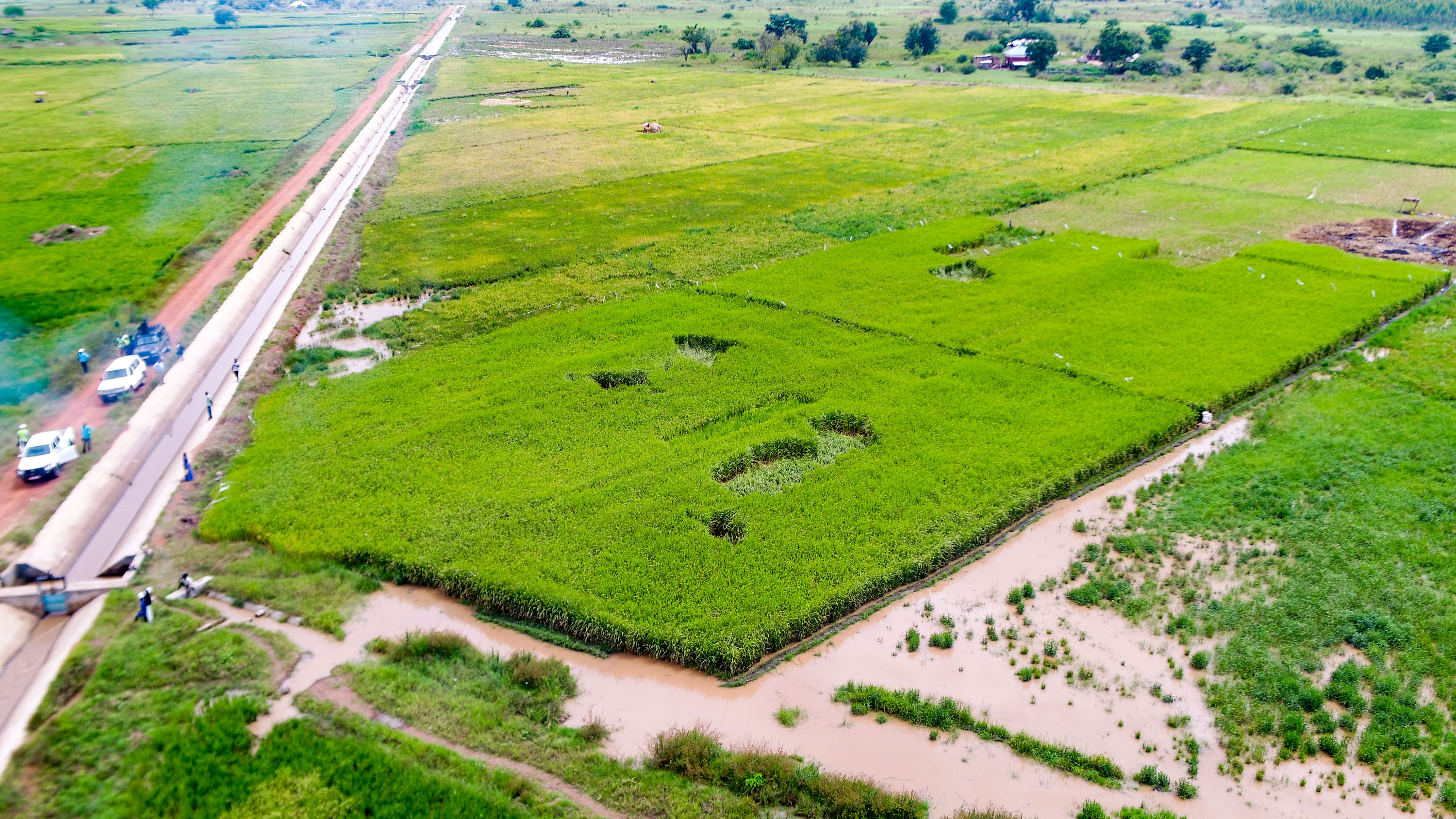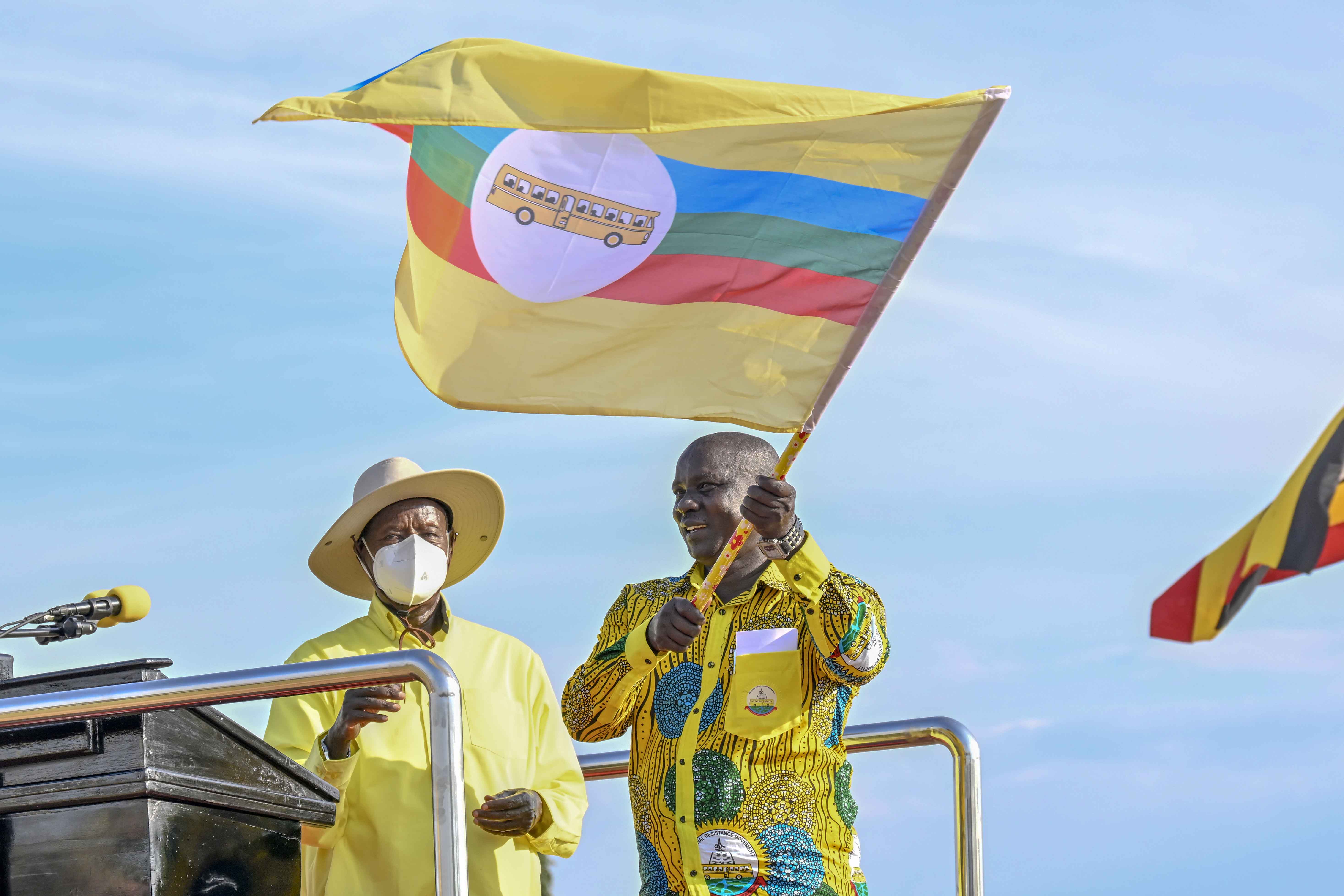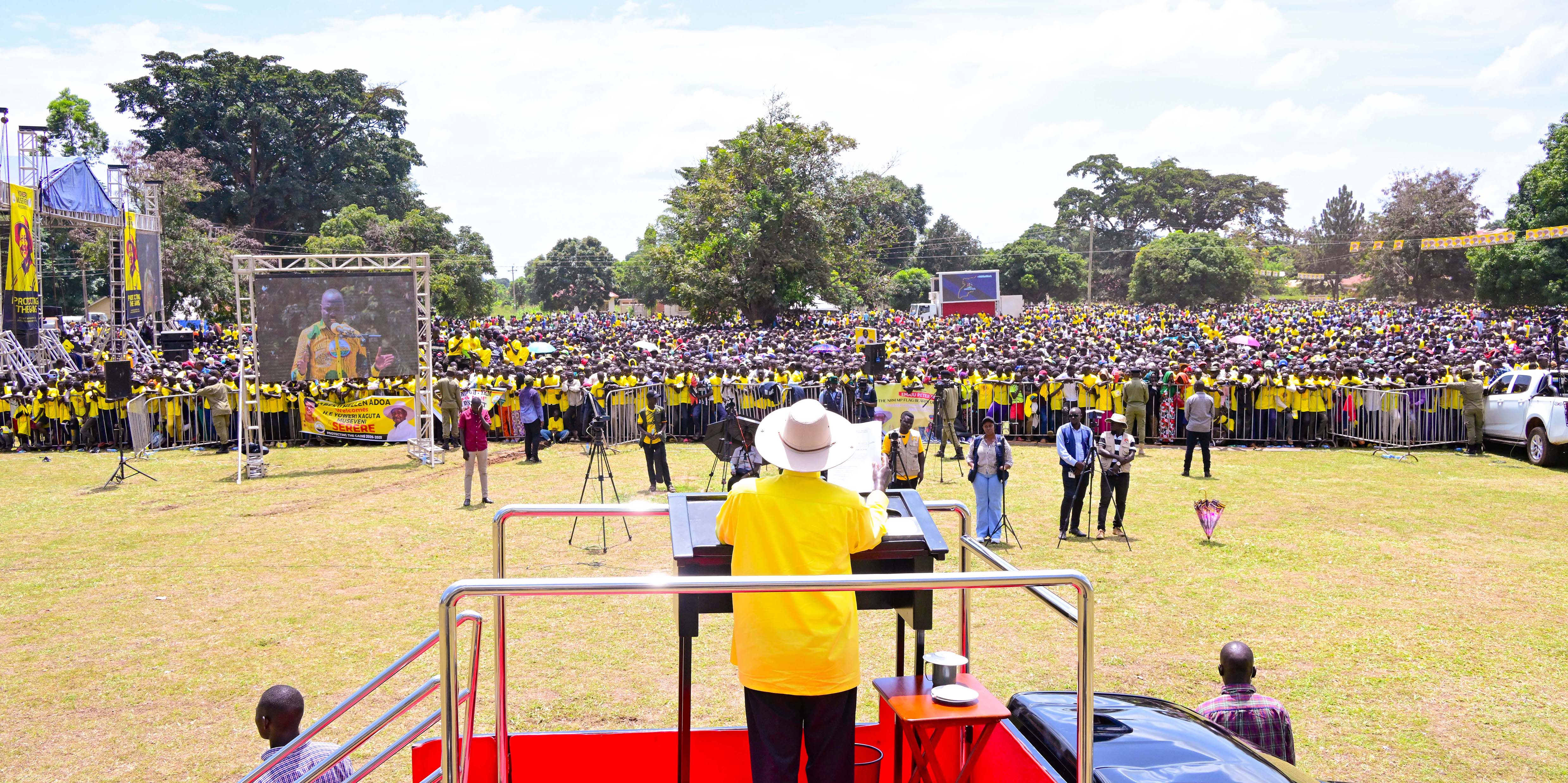.jpg)
PRESIDENT MUSEVENI WOOS BULAMBULI VOTERS, PLEDGES DIGNIFIED RESETTLEMENT FOR LANDSLIDE VICTIMS
President Yoweri Kaguta Museveni has assured landslide victims in Bulambuli District of a dignified and permanent resettlement, reaffirming the government’s commitment to protecting communities living in disaster-prone areas along the Mt. Elgon slopes. “The families are waiting to be resettled on 2,000 acres. Each family is to have two acres and 10 million shillings. And there is 50 billion shillings to buy more land. That’s the current arrangement,” H.E. Museveni said. The President, who is also the National Resistance Movement (NRM) presidential flag bearer, made the remarks today during a campaign rally at Nabbongo Secondary School playground in Bulambuli District. The pledge comes as part of an ongoing resettlement programme for victims of recurrent landslides that have ravaged the Mt. Elgon sub-region, especially in Bududa, Manafwa, Sironko, and Bulambuli districts. President Museveni reflected on the government’s longstanding policy of relocating people from dangerous mountainous areas, noting that it was driven by scientific and environmental concerns. He likened deforestation and unplanned settlement on steep slopes to “undressing Mother Nature,” a metaphor he said underscored the importance of conserving forests and vegetation cover. “When you see your mother naked, you’re already in danger,” President Museveni said. “We discouraged you from undressing Mother Nature through destroying forests and trees, which hold the soil together. Once you cut the trees, especially on steep land, the soil is washed away,” he emphasized. The President recalled visiting Nametsi village in Bududa District in March 2010 after a massive landslide buried the entire village, killing at least 365 people and displacing thousands. “I went myself to Nametsi in Bududa, where the whole village had been buried. It was terrible - as if the country had no people of knowledge. Now that people know the danger, we are going to work full steam to get people out of danger. The plan is to give people two acres plus ten million,” he assured. The 2010 Nametsi tragedy, Uganda’s deadliest landslide on record, affected several villages, including Kubewo and Namakansa. The disaster became a turning point in the government’s disaster management policy, prompting the establishment of the Bunambutye Resettlement Camp in Bulambuli District. The Minister for Relief, Disaster Preparedness and Refugees, Hon. Hilary Onek, who accompanied the President, said significant progress had been made in resettling victims. “Our ministry has managed to rescue those from the disaster area; most of them are now kept in the settlement camps waiting for relocation to land,” Hon. Onek said. “We have so far got 2,661 acres of land here, where we have started settling the families that are in the Bunambutye Resettlement Camp.Currently, we have 50 billion shillings to be used to buy more land to settle more families in Bulambutye.” The President said the relocation programme aims to prevent further loss of life by moving people before disasters reoccur. “The plan is to get out of danger before time. There are certain parts of the mountains where people should not settle. It is dangerous for them, for the future, and for the country.” Turning to economic empowerment, Museveni said Bulambuli would benefit from the ongoing national cattle restocking programme. He said Families in Lango, Teso, and Acholi are going to be supported with five cattle each to restock, and it would therefore be unfair to leave out Bulambuli and Ngenge in Kween. “It is therefore fair not to leave out Bulambuli and Ngenge in Kween. Not all parts of Bugisu and Sebei, but some parts that we know will be treated the same way,” he said, further promising to engage the government to ensure that the affected sub-counties in Bulambuli and Kween districts are handled the same way as those in Lango, Teso, and Acholi. NRM Manifesto Commitments: President Museveni used the occasion to outline key achievements of the NRM government and to explain the core pillars of the 2026–2031 NRM Manifesto, which he said builds on the party’s seven major contributions over the last 40 years - peace, development, and wealth creation being central among them. “You people of Bulambuli are witnesses of peace,” President Museveni said. “I remember there was a woman councillor of Mbale District, Rose Muloni—later Minister Irene Muloni’s sister, who told me about the suffering caused by cattle rustlers. But all that is now history.” The President emphasized that peace had created the foundation for development, noting major infrastructure projects in the region. “The road from Mbale all the way to Karamoja is now tarmacked. The road from Kapchorwa is also tarmacked,” he said. “For Bulambuli, you don’t have good marram roads because of volcanic soils,” President Museveni added, saying that he suggested long ago “that we bring stones from Karuma power station to make your roads better.” President Museveni also highlighted progress in education and health infrastructure, promising that all parishes without government primary schools and all sub-counties without government secondary schools would be catered for. According to government data, Bulambuli District has 54 government primary schools and 71 private primary schools, alongside 12 government secondary schools and 6 private secondary schools. The district’s 123 parishes host only 54 government primary schools, leaving 69 parishes without one. President Museveni said the government was addressing this gap through the construction of three new secondary schools, which will reduce sub-counties without government secondary schools from 14 to 11. “Similarly, sub-counties without government secondary schools will get one. The policy is clear - one government primary school per parish and one secondary school per sub-county,” he said. He further reaffirmed the commitment to strengthen the health sector by upgrading and constructing new health facilities. Bulambuli currently has one Health Centre IV and 17 Health Centre IIIs out of 26 sub-counties. Eight sub-counties still lack any form of health facility. President Museveni said the government plans to upgrade and build additional health units to fill these gaps. Proposed upgrades include Atari HCII to HCIII in Bumufuni Sub-county, Bugudoi HCII to HCIII in Soti Sub-county, and Nabiwutulu HCII to HCIII in Nabiwutulu Sub-county, as well as the construction of new HCIIIs in Buyaga Town Council, Bufumbo, Bulegeni, Muyembe, and Bunalwere Sub-counties. “We need a Health Centre IV per constituency and a Health Centre III per sub-county,” he said. “All the above are in our manifesto.” Wealth Creation: President Museveni reminded residents to distinguish between development, which benefits everyone, and wealth, which is personal and family-based. “Development like roads and electricity is for all of us, but wealth is mine as an individual or a family,” he said. “It is dangerous for people to emphasize development and forget wealth.” He cited government programmes such as Entandikwa, Operation Wealth Creation (OWC), Emyooga, and the Parish Development Model (PDM) as channels for promoting household prosperity. Bulambuli District has so far received Shs 37.7 billion under PDM, of which 99.8% has been disbursed to 38,846 beneficiary households out of 55,103 total households, representing 70.5% coverage. “The remaining 29.5% of households will also be reached,” President Museveni assured. “The aim is for every household to join the money economy.” The Speaker of Parliament and NRM Second National Vice Chairperson, Rt. Hon. Annet Anita Among, who hails from neighboring Bukedea District, called upon residents to vote for President Museveni, praising his legacy of peace and inclusive leadership. “We have brought you a candidate who believes in politics of interest, not of identity,” she said. “He is a national leader who listens to everyone in Uganda and solves their problems. Your Excellency, you are the hope of the people—you brought these people from despair to hope.” She also addressed concerns about compensation for landslide victims, promising to oversee verification to ensure fairness. “Some people were paid and others were not. We are going to verify the numbers to ensure those who were not paid receive their compensation,” she said. Speaker Among highlighted that the Acomai Irrigation Scheme, commissioned by the President a day earlier, is a symbol of the government’s investment in the region. The scheme serves both Bulambuli and Bukedea Districts, linking the Bugisu and Teso sub-regions. Mr. Echodu Calvin, the NRM Vice Chairperson for Eastern Region, thanked the President for his visit and urged affirmative action for Bulambuli, citing its history of cattle rustling and natural disasters. Mr. Kimamati Paul Michael, the NRM Chairperson for Bulambuli District, lauded government achievements, estimating that Bulambuli has benefited from Shs 180 billion in government support over the past five years. However, he also presented key demands, including: the upgrading of Muyembe Health Centre IV to a district hospital, elevating Bunyanya HCIII to HCIV, and upgrading six other Health Centre IIs to HCIIIs. He also called for the establishment of Bugisu University in Mbale to serve the broader Elgon sub-region. Bulambuli’s Electoral Record: Bulambuli District has 26 sub-counties and town councils, 123 parishes, and 1,313 villages, with a population of 235,391, according to the 2024 census. In the 2021 presidential election, the district had 71,664 registered voters, of whom 52,560 (73.3%) cast their ballots. President Museveni garnered 38,972 votes (76.4%), while the National Unity Platform (NUP) candidate received 10,788 votes (21.1%). For the upcoming election, 79,699 voters are registered across 257 polling stations, an increase of 8,035 voters and 12 stations since 2021. The event was also attended by ministers, Members of Parliament, and NRM flag bearers from across the region.











